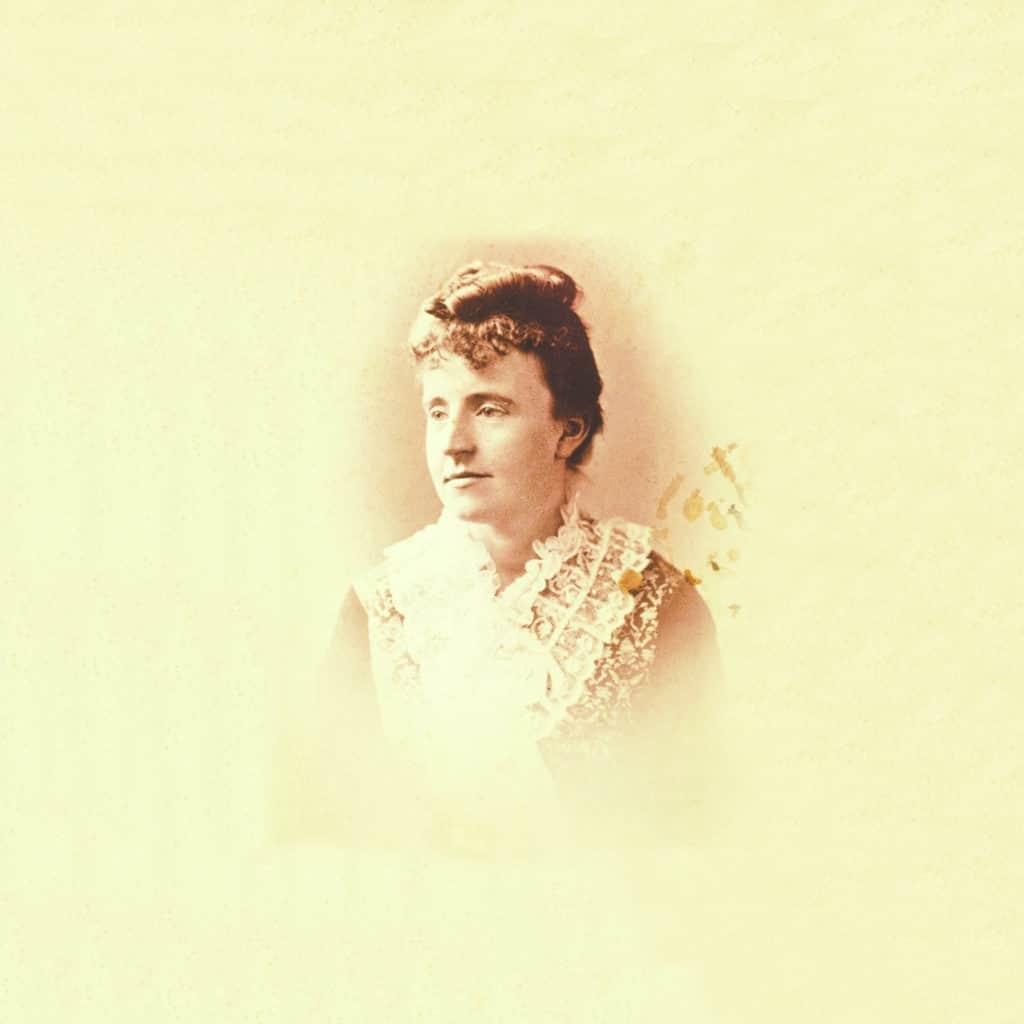“Where you tend a rose…a thistle cannot grow.” – The Secret Garden
 Resting peacefully in a grove at Roslyn Cemetery is the author of The Secret Garden (1911), one of the most famous children’s books of all time. Frances Eliza Hodgson Burnett was a British-born American novelist and playwright, born on November 24, 1849 in Cheetham, Manchester, England.
Resting peacefully in a grove at Roslyn Cemetery is the author of The Secret Garden (1911), one of the most famous children’s books of all time. Frances Eliza Hodgson Burnett was a British-born American novelist and playwright, born on November 24, 1849 in Cheetham, Manchester, England.
Her family emigrated to the United States in 1865, settling near Knoxville, TN, initially. It is here where she began, at a teenager, to write for magazine publications to help the family financially.
She married Dr. Swan Burnett in approximately 1872 and had two sons, Lionel (1874) and Vivian (1875). Lionel died from illness at age 15 in 1890, naturally causing a relapse in her depression, which she reportedly struggled with her whole life.
Burnett made her reputation as a novelist in 1877 with That Lass O’Lowrie’s, but it wasn’t until 1885 that she delved into children’s literature with Little Lord Flauntleroy.
She divorced Swan in 1898 and remarried Stephen Townsend a year later. The press was not kind to her during her divorce proceedings or in her decision to take on a new husband who was 10 years her junior. The press had once called her a “new woman,” a definite insult at the time.
In 1907, Burnett moved to Long Island, having built a home in Plandome, which was completed in 1908. It was here, in 1911 that she published The Secret Garden, that had been inspired several years earlier while she was living back in England at Great Maytham Hall.
“Her writing was well-loved while she was alive,” said Keri Wilt, Burnett’s great-great-granddaughter. “The only exception to that rule was The Secret Garden, which was a commercial failure during her lifetime; it wasn’t even mentioned in her NY Times obituary.”
She adds, “It wasn’t until the years after her death that it began to rise in popularity.”
In an episode of PBS’s Antiques Roadshow (season 13), Wilt explained that as a result of an author publishing a theatrical piece based on Burnett’s book, Little Lord Fauntleroy, the lawsuit which ensued inspired copyright law as we know today. In 1888 she won a lawsuit in England over the dramatic rights to Little Lord Fauntleroy, establishing a precedent that was incorporated into British copyright law in 1911.
The appraiser of Wilt’s presented item, associated with the lawsuit, explained, “Because this becomes one of the most important precedents in copyright law, you not only have an archive that’s significant for its literature, but the whole collection is also important as an archive for establishing copyright law between media. In the 19th century, it was very difficult for authors to protect their work. Because of this lawsuit, they establish a precedent where authors were to receive royalties for other kinds of works.”
The Manhasset Press had a chance to chat with Wilt (daughter of Verity, Vivian’s daughter) who is also a writer and a motivational speaker in Texas. She shared some things about her great-great-grandmother, her writing and her life on Long Island.
In a transcribed letter from Burnett to author friends, she tells of building her new home in Plandome.
There is a Stairmaker hammering away about four feet from me. He is one of the occult problems I find myself trying with sweet patience to solve. It is certainly three months—or four—since Vivian first began to search the dictionary for language sufficiently powerful to employ with a view to inducing them to “get a move on”, but nothing has transpired. (He is now whistling sweetly some gem from a popular opera.) He comes and spends four or five happy, peaceful house with us, cheering us b his bright presence and then, having put in one balustrade, I think he goes abroad for a few weeks. He returns, refreshed, and after a joyous day spent with another balustrade, take to his yacht again. I think he must to in a yacht.
…When you come to spend the summer with me in the far off years when the work is completed, you will say the place is lovely and you will like the house and the terrace and the big piazzas and the view—but let no one speak to me again of the pleasure of building one’s own house…
This will end—and after it is over the lovely Manhasset Bay will still lie smiling at the foot of the law and will shall go in the scented evenings down the wise stone steps (which are not being built) down the rose ban to the little curving beach and get into the pretty boat—which I can see from my window as I write—lying like a white dove on the water—and we shall float about, tinkling guitars and things, or merely being quiet, and we shall be sure to say, ‘How lovely! How adorable!’ But in the meantime, let each man, woman and child who loves me at all understand that I do not write because I cannot.
…We came in on May 25th in the mad hope that by doing so we might push the workmen out—but we had not counted with the Stairmaker—the Terrace lawyers—the Painters, and the Builders of the garage. I could have endured these better if I had not simply revelled [sic] in neuritis.
This transcription also appeared in the biography, Waiting for the Party: The Life of Frances Hodgson Burnett 1849-1924 by Ann Thwaite.
She maintained the Plandome home for summers and spent the winters in Bermuda.
“She was civic-minded and supported many charities,” Wilt said. “She was very famous and a prominent member of the community.”
Burnett lived the final 17 years of her life in her Plandome home.
 She died at the aged of 74 at her home in Plandome in 1924. Her son, Vivian, who died in 1937, is buried with her. A life-sized effigy of her son, Lionel, was erected several feet away and looks after her final resting place.
She died at the aged of 74 at her home in Plandome in 1924. Her son, Vivian, who died in 1937, is buried with her. A life-sized effigy of her son, Lionel, was erected several feet away and looks after her final resting place.
“Frances herself, by name alone, is no longer a household name, except with true fans,” said Wilt. “But the popularity of her best-selling [novels] show no signs of fading quietly into history.”































